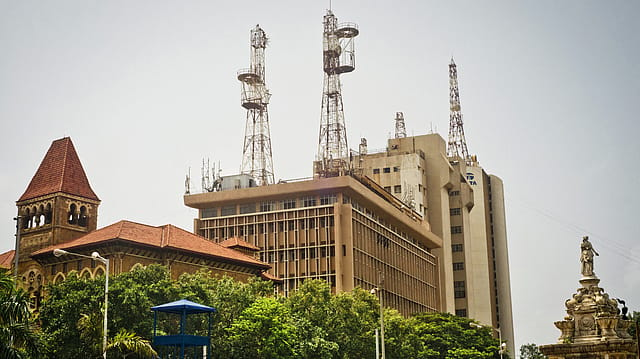SC refuses AGR relief to telcos, again
ADVERTISEMENT

In a huge blow to telecom companies, especially Vodafone Idea for which the endgame maybe near, the Supreme Court (SC) on Friday rejected the telecom companies’ (telcos) plea seeking more time to pay AGR-related dues and engage with the government to work out flexible terms and conditions for paying the same.
The telcos, including Vodafone Idea and Bharti Airtel, need to cough up a massive sum of over ₹1 lakh crore by way of dues payable to the government, calculated as a percentage of their adjusted gross revenue (AGR). This sum is for the last 14 years during which time the matter of interpretation of AGR was in court and includes penalty and interest for the time gone by.
While hearing the matter on Friday, a three-judge bench of the apex court lashed out at the Department of Telecommunications (DoT), asking on whose direction did it delay collection of these dues, when the SC had passed no order to that effect. In October 2019, the SC had held that the government’s interpretation of AGR to include the non-core revenue of telcos was valid and the latter would need to pay dues based on this by January 23. In January, the SC had rejected a review petition filed by the mobile operators. However, since they had filed a modification petition in the SC (which was the case being heard on Friday), the DoT didn’t initiate recovery of these dues pending the court’s decision.
However, the court took a stern view on the matter and initiated contempt proceedings against the telcos, their officials, and the DoT. The SC asked the telcos to deposit the dues by March 17. Soon after the telcos had filed a petition for modification of the court's order in January, the DoT had issued a letter stating that no coercive action should be taken against the service providers, pending the outcome of the petition. Post the court's observations on Friday, the DoT is learnt to have withdrawn that letter and asked the telcos to pay the dues at the earliest. For one of the telecom circles, the DoT has asked the dues to be paid by midnight tonight.
Friday’s developments in the apex court cast an existential question on the fate of Kumar Mangalam Birla-led Vodafone Idea. Only yesterday (Thursday), Vodafone Idea, while announcing its earnings for the October-December 2019 quarter, had stated that there was a significant doubt on the company’s ability to continue as a going concern and its ability to generate cash flow that it needs to settle, or refinance its liabilities including those relating to the SC’s AGR judgment. “Our ability to continue as a going concern is dependent on positive outcome of the application for modification of the supplementary order before...the SC and subsequent agreement with the DoT for the payment in instalments after some moratorium and other reliefs.”
Vodafone Idea reported a loss of ₹6,348 crore for the quarter ended December 31, 2019, on account of provisions towards its AGR dues, which could be in the region of ₹53,000 crore. Vodafone Idea had also posted a massive loss of ₹50,922 crore in the preceding July-September 2019 quarter as well.
The question now is: Is this the end of the road for Vodafone Idea? If the company’s chairman Kumar Mangalam Birla’s statement in January is anything to go by, it is. Speaking at the Hindustan Times Leadership Summit in New Delhi, Birla had said that Vodafone Idea would have to shut shop in case the telco didn’t get any relief on AGR dues. He also ruled out infusion of further equity into the company, saying that it didn’t make sense to put good money after bad.
Vodafone Idea’ share price declined a whopping 23.21% on the BSE on Friday to close at ₹3.44 a share. The bourse’s benchmark index, S&P BSE Sensex shed 0.49% to end at 41,257.74 points.
Sunil Mittal-led Airtel, on the other hand, saw its stock price rise 4.69% to ₹565.10 per share. Investors are bullish on Airtel, as it has been able to raise capital ($3.1 billion in debt and equity from foreign investors) in a timely manner, which will help the company pay whatever AGR dues finally falls upon it, as well as invest for future growth. Also, the market appears to be betting on the fact that in case Vodafone Idea collapses, its 304 million subscribers would make a beeline to join either of the two surviving private sector mobile telephony service providers—Airtel or Mukesh Ambani-led Reliance Jio Infocomm (Jio).
It was widely anticipated that had the court allowed it, the government would not allow Vodafone Idea—a joint venture between the U.K.’s Vodafone Group Plc and the Aditya Birla Group—to collapse as it would send a wrong signal to foreign investors. It also runs the risk of making the Indian telecom market a duopoly, which may not be in the best interest of subscribers in the long run. A shrunk telecom market is also not good news for a government that is struggling with a sizeable fiscal deficit. The government earns significant revenue in a year from telecom spectrum and licence-related dues.
But the SC judgment on Friday may tie the government’s hands. It remains to be seen whether the telcos and the government can put their heads together and figure out an alternate solution to ease the sector’s pain in general and specifically ensure Vodafone Idea doesn’t die a natural death.
Otherwise, it is bad news for Vodafone Idea’ customers and shareholders.